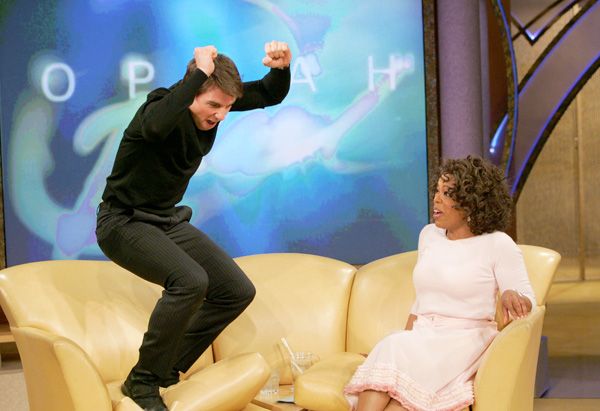10 reasons why Oprah should run for president
Leave it to Oprah to deliver the kind of rousing speech the 2018 Golden Globes (not to mention the wider industry) so desperately needed.
Upon accepting the Hollywood Foreign Press Association’s Cecile B. DeMille award at yesterday’s Golden Globe Awards, Winfrey delivered a lengthy and impassioned speech fighting back against the patriarchy, noting her own mother amongst Recy Taylor and Rosa Parks, and thanking the long-standing sufferers of sexual harassment and abuse for speaking up about their experiences in the latter half of last year.
“For too long, women have not been heard or believed if they dare speak the truth to the power of those men,” Winfrey poignantly notes, while the audience began their first of three standing ovations. “But their time is up. Their time is up.”
It was the kind of speech that drew the attention of millions – and a slew of retweets, regrams, posts and stories followed. Not many can hold or captivate an audience like Oprah can, especially when the message was as powerful as this.
Which led to us thinking – how great would Oprah be as the future president of the United States?
Naturally, we’re not the first to have this lightbulb moment. History would have it that Oprah has rebuffed repeated efforts to have her run for office, and the answer remains the same: “I will never run for public office.”
But after last night’s Golden Globes, these rumours have surfaced once again, with one source noting Oprah is actively thinking about launching a presidential bid, perhaps as early as the 2020 elections.
She’s been in the inspiration business for over 30 years, but last night’s intention-setting speech seemed somewhat different. “A new day is on the horizon” was a repeated message throughout the producer, actress and host extraordinaire’s address.
With this in mind, we've compiled 10 things you may not know about the talk show maven:
1. #TimesUp is a cause close to her heart
In 1986, Oprah announced on The Oprah Winfrey Show that she was raped as a child. Empowering her audience to share their own hardships, this was just the start of her unofficial campaign against abuse, and set the M.O for her talk show. The talk show queen has since lobbied the government to action the National Child Protection Act, which established a national database of convicted child abusers.
2. She's campaigned once before
In 2007, Oprah publicly backed democratic presidential hopeful Barack Obama, by attending a series of rallies in Iowa, New Hampshire and South Carolina. Many fans were displeased by Oprah's public backing of Barack, noting she should support Clinton in the gender race.
3. She knows how to captivate an audience
Oprah's public address at the Golden Globes isn't the first time the philanthropist has left crowds in tears. During the some 4,560 episodes produced of The Oprah Winfrey Show, Oprah's innate talent for having guests open up on her sofa saw the likes of Barack Obama produce his birth certificate, Sarah Ferguson talk openly about why she wasn't invited to the royal wedding, a disgraced Lance Armstrong openly admit to doping, an exclusive walk through with Michael Jackson through Neverland, as well as shocking audiences by revealing she has a half sister she'd never met.
4. Money matters
Forbes deemed Oprah as the only black female billionaire in history, with a current net worth of $2.7 billion US.
5. She's generous to a fault
She famously gave away brand new Pontiac G6 sedans to all 276 members of the audience during her talk show in 2004, which set a precedent for the host to gift her audience generously on multiple occasions, most notably her Christmas specials.
6. Education is her priority
In 2007, Oprah opened Winfrey's Leadership Academy in Johannesburg, with the all female roll of 150 students coming from low-income families. The initiative came about after Oprah met former South African president Nelson Mandela in 2002.
7. A-listers love her
For her final show in 2011, The Oprah Winfrey Show saw a slew of celebrities join her on stage for a star-studded farewell. Madonna, Tom Cruise, and Will Smith helped Oprah close out the tearful finale after 25 years onscreen.
8. She's not afraid of the hard-hitting issues
A mere six months since the inception of her show, Oprah ventured to all-white community Forsyth County in Georgia, intent on shedding a light on the racist views of locals. Returning 23 years later, more than 7,000 African-Americans had taken up residence there, noting it as "a great place to live".
9. The Oprah Effect
Forget the Midas touch, the Oprah Effect saw hundreds of authors books fly off the shelves after she launched her Book Club in 1996.
10. She made Tom Cruise do this:

All jokes aside, read Oprah’s inspiring Golden Globes speech in full, here:
Thank you, Reese. In 1964, I was a little girl sitting on the linoleum floor of my mother's house in Milwaukee watching Anne Bancroft present the Oscar for best actor at the 36th Academy Awards. She opened the envelope and said five words that literally made history:" The winner is Sidney Poitier." Up to the stage came the most elegant man I ever remembered. His tie was white, his skin was black—and he was being celebrated. I'd never seen a black man being celebrated like that. I tried many, many times to explain what a moment like that means to a little girl, a kid watching from the cheap seats as my mom came through the door bone tired from cleaning other people's houses. But all I can do is quote and say that the explanation in Sidney's performance in Lilies of the Field: "Amen, amen, amen, amen."
In 1982, Sidney received the Cecil B. DeMille award right here at the Golden Globes and it is not lost on me that at this moment, there are some little girls watching as I become the first black woman to be given this same award. It is an honor—it is an honor and it is a privilege to share the evening with all of them and also with the incredible men and women who have inspired me, who challenged me, who sustained me and made my journey to this stage possible. Dennis Swanson who took a chance on me for A.M. Chicago. Saw me on the show and said to Steven Spielberg, she's Sophia in 'The Color Purple.' Gayle who's been a friend and Stedman who's been my rock.
I want to thank the Hollywood Foreign Press Association. We know the press is under siege these days. We also know it's the insatiable dedication to uncovering the absolute truth that keeps us from turning a blind eye to corruption and to injustice. To—to tyrants and victims, and secrets and lies. I want to say that I value the press more than ever before as we try to navigate these complicated times, which brings me to this: what I know for sure is that speaking your truth is the most powerful tool we all have. And I'm especially proud and inspired by all the women who have felt strong enough and empowered enough to speak up and share their personal stories. Each of us in this room are celebrated because of the stories that we tell, and this year we became the story.
But it's not just a story affecting the entertainment industry. It's one that transcends any culture, geography, race, religion, politics, or workplace. So I want tonight to express gratitude to all the women who have endured years of abuse and assault because they, like my mother, had children to feed and bills to pay and dreams to pursue. They're the women whose names we'll never know. They are domestic workers and farm workers. They are working in factories and they work in restaurants and they're in academia, engineering, medicine, and science. They're part of the world of tech and politics and business. They're our athletes in the Olympics and they're our soldiers in the military.
And there's someone else, Recy Taylor, a name I know and I think you should know, too. In 1944, Recy Taylor was a young wife and mother walking home from a church service she'd attended in Abbeville, Alabama, when she was abducted by six armed white men, raped, and left blindfolded by the side of the road coming home from church. They threatened to kill her if she ever told anyone, but her story was reported to the NAACP where a young worker by the name of Rosa Parks became the lead investigator on her case and together they sought justice. But justice wasn't an option in the era of Jim Crow. The men who tried to destroy her were never persecuted. Recy Taylor died ten days ago, just shy of her 98th birthday. She lived as we all have lived, too many years in a culture broken by brutally powerful men. For too long, women have not been heard or believed if they dare speak the truth to the power of those men. But their time is up. Their time is up.
Their time is up. And I just hope—I just hope that Recy Taylor died knowing that her truth, like the truth of so many other women who were tormented in those years, and even now tormented, goes marching on. It was somewhere in Rosa Parks' heart almost 11 years later, when she made the decision to stay seated on that bus in Montgomery, and it's here with every woman who chooses to say, "Me too." And every man—every man who chooses to listen.
In my career, what I've always tried my best to do, whether on television or through film, is to say something about how men and women really behave. To say how we experience shame, how we love and how we rage, how we fail, how we retreat, persevere, and how we overcome. I've interviewed and portrayed people who've withstood some of the ugliest things life can throw at you, but the one quality all of them seem to share is an ability to maintain hope for a brighter morning, even during our darkest nights. So I want all the girls watching here, now, to know that a new day is on the horizon! And when that new day finally dawns, it will be because of a lot of magnificent women, many of whom are right here in this room tonight, and some pretty phenomenal men, fighting hard to make sure that they become the leaders who take us to the time when nobody ever has to say 'Me too' again."



